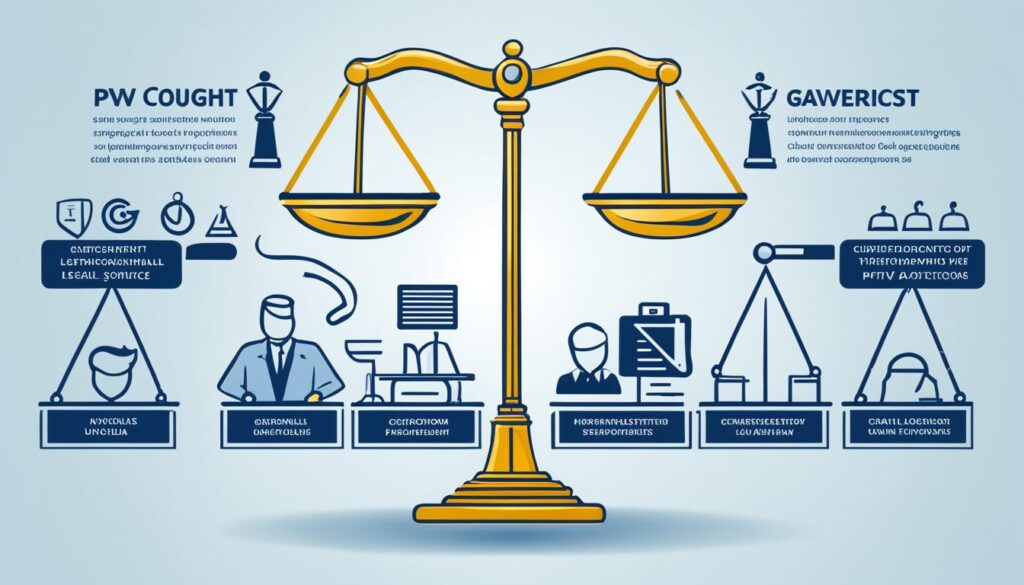As the popularity of Canada IPTV services continues to grow, Canadians are becoming more aware of the intricacies of legal streaming in the Canadian market. Understanding IPTV legal issues in Canada is essential for consumers looking to enjoy their favorite shows without stepping into a legal grey area. In this digital age where content is king, it’s crucial to ensure that the services you use are above board, safeguarding both your interests and those of content creators.
Key Takeaways
- Researching IPTV providers for proper licensing is key to legal streaming in Canada.
- Understanding Canada’s copyright law enhances informed decision-making.
- Opt for transparency and customer service when choosing an IPTV service.
- Always check for CRTC approval for any IPTV services to avoid potential legal issues.
- Stay informed about recent changes in legislation affecting IPTV legal issues in Canada.
The Basics of IPTV Technology and Legal Recognition
Exploring the world of television content delivery, the term ‘IPTV’ often emerges as a modern solution that expands viewing options for consumers. Comprehending the IPTV definition and seeing IPTV functioning firsthand illuminates how sophisticated this technology truly is. IPTV harnesses the power of the internet, delivering a diverse array of programming with convenience and efficiency. Accessing this service in Canada, however, entails navigating the legal framework that governs digital content distribution.
The Definition and Functioning of IPTV
At its core, the IPTV definition encapsulates a service where television content is not disseminated through traditional terrestrial, satellite signal, or cable television formats. Instead, it relies on digital data transmission over IP networks. Thus, the IPTV functioning involves streaming media, allowing users to access live broadcasts and video on demand (VOD) via the internet. This revolutionary method necessitates a stable internet connection, often in conjunction with a decoder or a smart TV, enhancing user flexibility and choice.
Canada's Stance on IPTV Services
In Canada, the legality of utilizing IPTV services is unequivocally linked to adherence to regulatory guidelines. The Canadian Radio-Television and Telecommunications Commission (CRTC) is the authoritative body that oversees and regulates the offering of legal IPTV in Canada. Dominant telecom companies generally helm such services, tendering a bouquet of channels with varying subscription plans. These services maintain legitimacy by aligning themselves with CRTC’s stringent regulations and ensuring the acquisition of pertinent content distribution licenses.
| IPTV Service Features | Legal Compliance in Canada |
|---|---|
| Live TV Broadcasting | CRTC’s Licensing Approval |
| Video on Demand (VOD) | Content Distribution Licenses |
| Time-Shifted Media | Regulatory Adherence to Broadcasting Regulations |
| Subscription Plans | Established Agreements with Content Providers |
| Interactive Services | Compliance with Canadian Copyright Laws |
For consumers, the differentiating factor for legal IPTV in Canada is largely tied to the provider’s commitment to fulfill regulatory necessities. Ultimately, this compliance safeguards consumer interests and ensures that televised content is not only diverse and accessible but also legally sanctioned.
Canada IPTV Services: Legality and Licensing Essentials
In the realm of digital broadcasting, authorized IPTV services in Canada have adhered to a strict protocol that aligns with the nation’s commitment to protecting the creators’ rights. It is the adherence to these stringent standards that distinguishes legal services from unauthorized ones, safeguarding both providers and consumers within the framework of Canada’s copyright law.
What Makes an IPTV Service Legal in Canada?
An IPTV service transcends into the realm of legality in Canada through the procurement of proper licensing in IPTV. Providers such as Helix, VMedia, and Rogers Ignite TV go through rigorous processes to secure these licenses. The legality of any IPTV service is anchored in its compliance with the guidelines laid down by the Canadian authorities, ensuring that the service does not infringe upon the intellectual property of content creators.

Understanding Licensing Agreements for Content Distribution
The complexity of content distribution in the realm of IPTV is simplified through licensing agreements. These agreements are not just transactions; they represent a commitment to the content’s originators, ensconcing their creative and financial rights within the sanctuary provided by Canada’s copyright law. Every such agreement constitutes a financial consideration that goes towards the content creators, ensuring their continued contribution to the vibrant landscape of entertainment and information.
To explore the extensive options of legal IPTV services that are in full compliance with regulatory standards, please visit https://getmaxtv.com/ for a comprehensive guide and service offerings that respect Canada’s commitment to copyright and licensing.
Identifying the Differences Between Legal and Illegal IPTV Providers
When it comes to choosing an IPTV service, understanding the distinctions between legal vs illegal IPTV is cardinal for Canadian consumers to enjoy secure streaming practices. Legal services license their content properly, honoring the IPTV content rights of creators, whereas illegal services often circumvent these regulations, leading to potential legal issues and substandard service quality.
The legal providers are usually affiliated with well-known telecommunications brands and can provide a guarantee of quality and security. In contrast, the red flags of illegal services include significantly discounted subscriptions or free offerings that cannot assure viewers of either the legality of the content or the safety of the streams.

To better understand the specifics, here’s a comprehensive breakdown contrasting attributes of legal and illegal IPTV providers:
| Characteristic | Legal IPTV | Illegal IPTV |
|---|---|---|
| Licensing and Content Rights | Valid content distribution licenses in place | No compensation to content rights holders |
| Cost | Subscription fees fund content creators and licensing | Low-cost or free, undervaluing content rights |
| Quality and Safety | High-quality streams; secure streaming applications | Potentially low-quality streams; higher security risks |
| Payment Methods | Traditional and secure payment options | May promote cryptocurrencies or untraceable payments |
| Brand Association | Often associated with established, reputable brands | Lack of a reputable brand or transparency |
| International Content | Access to content is geographically appropriate | Offers geographically restricted channels without rights |
To secure a legitimate and enjoyable IPTV experience, consumers are encouraged to opt for providers like those found at GetMaxTV, where thorough adherence to Canadian laws and quality benchmarks are the norm.
Recent Legal Actions and Copyright Enforcement in Canada
As part of ongoing effort to uphold legal standards within the multimedia sector, recent IPTV court actions have been a significant focal point for copyright enforcement in Canada. Sweeping measures have been taken not only against illegitimate streaming services but also against the individuals enabling and using these services. This intensification of legal scrutiny underlines the necessity for users to engage with authorized providers such as GetMaxTV, ensuring compliance with Canadian laws and respecting the intellectual property of creators.

Federal Court Decisions and Industry Crackdowns
Reflecting on the escalated legal countermeasures, recent IPTV court actions have clearly articulated the Federal Court’s stance: zero tolerance for copyright infringement. One of the most notable court decisions includes the injunctions placed upon sellers of Android boxes pre-configured with illegal streaming applications. These verdicts are just one aspect of the broader industry crackdowns that resonate the commitment to copyright enforcement in Canada.
High-Profile Cases and Legal Precedents
High-profile cases have set important IPTV service legal precedents, marking a turning point in the enforcement of digital content rights. These cases have addressed illegal services at various levels, from shutting down operations to penalizing individual subscribers of such services. The table below outlines some of the pivotal legal actions that have recently reshaped the IPTV landscape in Canada.
| Case | Action Taken | Impact |
|---|---|---|
| Set TV | Service Shutdown | Federal injunction led to a complete cessation of operations, sending a strong deterrent message to similar entities. |
| GoldTV | Blocking Order | In a groundbreaking move, ISPs were court-ordered to block access to the service, setting a precedent for future piracy-related cases. |
| IPTV Domain Seizure | Domain Seizure | The seizure of multiple domains as part of a collaborative effort between authorities disrupted access to illegal IPTV content. |
Safe Streaming: How to Protect Yourself When Using IPTV
In the age of digital entertainment, the promise of safe IPTV streaming beckons to consumers across Canada. Yet, as the demand grows, it becomes ever more crucial to emphasize payment security and strategies for avoiding IPTV scams. Vetted and legitimate providers like those found at https://getmaxtv.com/ offer solace in a market teeming with uncertainty.

Before subscribing to any IPTV service, it’s imperative to conduct due diligence. This isn’t merely about securing a ceaseless cascade of content but fundamentally about safeguarding one’s digital and financial footprint against the lurking prevalence of scams.
Precautions to Take When Selecting IPTV Services
Finding a provider that values transparency in their licensing and content offerings is the first step towards safe IPTV streaming. Here are some bulletproof strategies to ensure you’re engaging with a provider that respects both the law and their customers:
- Verify provider credentials and legality of the service.
- Read user reviews and check for any red flags.
- Ensure clear and upfront pricing with no hidden fees.
- Look for providers that offer detailed descriptions of the content available.
Ensuring Payment Security and Avoiding Scams
To mitigate the risks of financial fraud, one must scrutinize the payment methods offered by IPTV providers. Aligning with providers that enable secure, conventional transactions can be a bulwark against potential scams.
| Payment Method | Security Level | Scam Risk Assessment |
|---|---|---|
| Credit Card | High | Low |
| Bank Transfer | High | Moderate |
| Cryptocurrency | Varies | High |
| PayPal or Other Online Payment Service | High | Low |
By affiliating oneself with reputable services that prioritize customer security as much as quality content, Canadian IPTV users can rest assured that their safe streaming experience is as secure as it is enjoyable.
Conclusion
Navigating the IPTV legal landscape in Canada centers on understanding the innovative technology and the legal framework that governs it. For consumers looking to engage in this dynamic domain, informed IPTV service selection is critical. Choosing reputable providers like GetMaxTV, which adhere to Canadian copyright law and honor licensing agreements, ensures the distribution of content remains transparent, of high quality, and is accompanied by attentive customer service.
Adopting IPTV best practices is not just about enjoying a vast array of digital media content—it’s about contributing to a fair digital economy. It’s crucial for users to be vigilant in maintaining legal streaming habits which in turn supports content creators. By avoiding unauthorized IPTV services, consumers protect against risks such as prosecution and compromised device security while upholding the integrity of the content distribution system.
To safeguard the enjoyment and safety of streaming IPTV services, it is advisable for users to perform due diligence, ensuring secure transactions and evading potential scams. Remember, a conscientious approach to selecting and using IPTV services in Canada will not only enhance personal media experience but also preserve a just and robust digital media landscape for all.
FAQ
What is IPTV and how does it function?
IPTV, or Internet Protocol Television, is a digital television broadcasting service where content is delivered over the internet. Unlike traditional television, IPTV allows viewers to stream media continuously with a stable internet connection, often through a decoder or a smart TV.
Is IPTV legal in Canada?
Yes, IPTV is legal in Canada when the service provider has obtained the proper licenses for the content it distributes and adheres to the regulations set by the Canadian Radio-Television and Telecommunications Commission (CRTC).
What are the legal requirements for IPTV services in Canada?
To be legal in Canada, IPTV services must comply with licensing requirements, copyright laws, and CRTC regulations. This involves securing the appropriate licenses that permit the distribution of copyrighted content, ensuring rights holders are compensated.
How can I differentiate between legal and illegal IPTV services?
Legal IPTV services are usually associated with established telecom companies and openly state their licensing agreements and content offerings. In contrast, illegal IPTV providers may offer subscriptions at significantly lower costs, fail to mention licensing, or provide access to geographically restricted content.
What are some examples of recent legal actions taken against illegal IPTV providers in Canada?
Canadian authorities have pursued illegal IPTV providers like Arubox.tv and Xtream Codes, with the Federal Court supporting measures to block sales of devices that give access to unauthorized streams. This showcases Canada’s commitment to copyright enforcement.
How can I ensure my safety and legality when streaming via IPTV services?
Verify the IPTV provider’s legitimacy, look for transparency about licensing, use secure payment methods, and be wary of providers requiring payment in cryptocurrencies to protect both your legal standing and personal information.
What precautions should I take when choosing an IPTV service to avoid scams?
Opt for services with clear pricing and content offerings, avoid deals that seem too good to be true, and ensure that the service complies with Canadian copyright law. Also, be cautious with services that deviate from standard payment methods.



